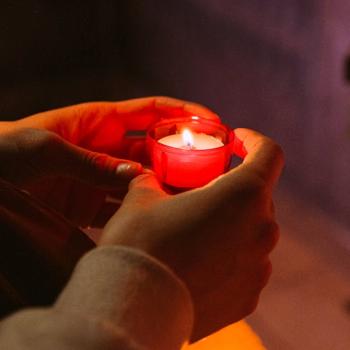The fun thing about having, as you put it, "a foot in two traditions," is that you can sometimes help others see their own tradition with new eyes. I have a ton to learn about more liturgical worship, of course, but my excitement about it and the evangelical spin I like to put on it seems to energize folks for whom a weekly Eucharist and The Book of Common Prayer is old hat. So that's been a lot of fun. I also find myself defending evangelicals when they are cast in a monolithic light. Nothing irks me more than a reporter or fellow progressive Christian describing evangelicals as "ignorant" or "bigoted" or "hateful." I get super-defensive and rather curtly remind them that, "Hey, that's my mom and dad you're talking about!"
Greg: Right. Mine too!
Jesus Went Back to Heaven and All He Left Me Was This Lousy Church was your favorite suggested title for the book. Brilliant. I have a magnet on my refrigerator, this illustration from some 1950s Sunday School quarterly where a guy in a suit is doing a walk and talk with Jesus. Only the caption on my magnet is: "Jesus, protect me from your followers!" What have you learned in your journey about the Church and what it's supposed to be for us? How have you observed that the Church can get in the way of our walk and talk with Jesus?
Rachel: In the book I write that "the good news is you are a beloved child of God; the bad news is you don't get to choose your siblings." This goes both ways, of course. There are plenty of Christians who look at me, roll their eyes and mutter, "who let her in?" Something I've always known, but which has been reinforced in recent years, is that you never find a perfect church full of perfect people. This isn't a kingdom for the worthy; it's a kingdom for the hungry. We're all sinners, invited to the Table by the grace of God. Essentially, the church is God's way of saying, "I'm throwing a banquet, and all these mismatched, messed-up people are invited. Here, have some wine."
That said, I want to acknowledge here, as I do in Searching for Sunday, that the church has both an incredible capacity to heal and an incredible capacity to wound. And some people's wounds are so deep or so fresh, they understandably don't want anything to do with church. I want to honor and respect that, even as I pray for healing and reconciliation.
Greg: One group that has been badly wounded by some Christian traditions is LGBT Christians. Your account of attending the Gay Christian Network's annual meeting was one of the most powerful and hopeful chapters in the book.
The treatment of gay Christians by and inclusion in the Church seems to have been a presenting issue for you, as it is for many Millennials. (And older people. I chose to be confirmed because of the Episcopal Church's inclusive stance on LGBT Christians.) What advice would you offer to any church or denomination still wrestling with this question? Why would you argue that Jesus want gays and lesbians in the pews and in the pulpits?
Rachel: The most important piece of advice I can offer to denominations still struggling with this question is to stop talking about LGBT people and start talking with LGBT people — and not with the agenda of proving a point, but with intent of simply listening to their stories. There are so many misconceptions, stereotypes, and harmful, fear-based assumptions about what it means to be gay, lesbian, bisexual, transgender (and asexual and intersex and so on) that could be dispelled with better information and better relationships. I recommend seeking out for dialog LGBT Christians like Justin Lee of the Gay Christian Network, Matthew Vines of the Reformation Project, Allyson Robinson of Calvary Baptist Church in Washington, writers Jeff Chu, Eliel Cruz, Dianna Anderson, and Ben Moberg, and activist/artists Vicky Beeching, Jennifer Knapp, and Neo Sandja. (I'm already thinking of more I could include. This is just a start.)
It may also be helpful to talk with parents of LGBT kids who are open about their stories, like Rob and Linda Robertson or Pastor Danny Cortez of New Heart Community Church in LaMirada, as well as theologians and ethicists like Dr. James Brownson and Dr. David Gushee who advocate for full inclusion of LGBT people in the family of God.
Why does Jesus want gays and lesbians in the pews and in the pulpits? Well, because for whatever reason, Jesus uses regular ole' sinners, saved by grace, to preach and proclaim the gospel and LGBT Christians are regular ole' sinners, saved by grace, called to preach and proclaim the gospel, just like you and me. And I think they may also have a special word for the more privileged among us about what it means to do kingdom work from the margins, with both a commitment to justice and a posture of grace.
Greg: The chapter "What We Have Done" is a beautiful piece of liturgy, confessing and claiming the good and bad of the Christian tradition. Is it, in some ways, a microcosm of your larger story — that we acknowledge what has been done in our names but aspire to the extraordinary faithfulness of the saints? And in a side question, in my original tradition we talked a lot about sin, but we never confessed it. Have you discovered public confession to be a powerful act (as I have come to find it since becoming Episcopalian)?





